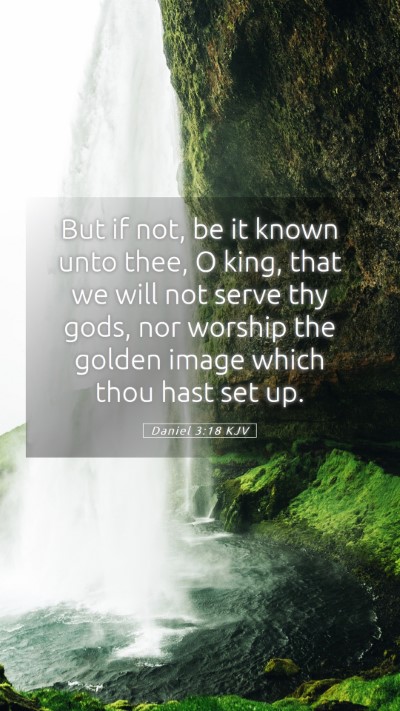Bible Verse Meaning: Daniel 3:18
Daniel 3:18 states: "But if not, be it known to you, O king, that we will not serve your gods,
nor worship the golden image that you have set up." This bold declaration by Shadrach, Meshach,
and Abednego exemplifies unwavering faith and loyalty to God, even in the face of dire consequences.
The story takes place during the reign of King Nebuchadnezzar, who commanded everyone to worship
a golden image he had erected. The refusal of these three Hebrews to bow down to the idol is a testament
to their commitment to the Lord and His commandments. They exemplify courageous faith, demonstrating that
true believers prioritize their relationship with God above any earthly authority or decree.
Bible Verse Explanations and Commentary
By delving into the insights provided by esteemed public domain commentators such as Matthew Henry,
Albert Barnes, and Adam Clarke, we can extract deeper meanings and practical applications from this verse.
Matthew Henry's Commentary:
Matthew Henry emphasizes the integrity and determination of Shadrach, Meshach, and Abednego.
He points out that their response to Nebuchadnezzar is not filled with rebellion but rather with
a profound commitment to God’s commands. He highlights the significance of their statement,
"But if not," which reflects their trust in God regardless of the outcome. They accepted
that God could save them from the fiery furnace, but they were prepared to endure suffering rather
than compromise their faith.
Albert Barnes' Notes:
Albert Barnes notes that the phrase "But if not" indicates a critical aspect of true faith:
that it is not based solely on the expectation of deliverance. Their faith was not contingent upon
God's immediate action or favor, highlighting that true loyalty transcends personal safety.
Barnes also connects this attitude with other instances of steadfast faith in the Scriptures, showcasing
their commitment to worship the one true God despite imminent death, reflecting an ultimate trust in God’s
sovereignty and plan.
Adam Clarke's Commentary:
Adam Clarke provides a historical context surrounding the decree of Nebuchadnezzar and comments on
the implications of fidelity in a foreign land. Clarke notes that these men displayed the spirit
of true servitude to God amid threats, which portrays a commendable example for believers facing
idolatry and moral dilemmas. Clarke’s analysis connects their actions with a broader call for steadfastness
in one's faith against the forces of secularism and idolatry that believers might encounter today.
Significance of Daniel 3:18
This verse serves as a powerful reminder for modern believers on the importance of standing firm in one's faith,
even when facing persecution or societal pressures. The response of Shadrach, Meshach, and Abednego encourages
believers to prioritize their spiritual convictions over worldly expectations.
Key Themes Explored
- Courage in Faith: Exemplified by the refusal to worship idols.
- Ultimate Loyalty to God: Prioritizing God's commands over human authority.
- Trust in Divine Sovereignty: Acceptance of God's will irrespective of circumstances.
Related Scripture References
- Exodus 20:3-5 - The commandment against idolatry.
- Isaiah 43:2 - God's promise of presence in trials.
- Matthew 10:28 - Fear God, who can destroy both soul and body.
Conclusion: Understanding Scripture through Daniel 3:18
The commentary and reflections on Daniel 3:18 provide rich insights for those seeking to
understand Bible verse meanings and interpretations. This passage invites believers to engage
in bible study insights that reinforce their faith. It challenges individuals to consider:
How can we apply such unwavering loyalty to God in our daily lives?
Through historical context, theological reflection, and application, understanding Scripture
takes on profound significance. In today's world, where many face similar situations of faith versus
societal pressure, the lessons from Daniel 3:18 remain evergreen and applicable.


